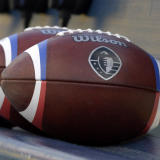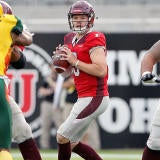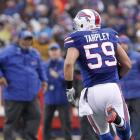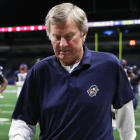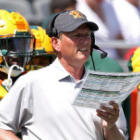A.J. Tarpley is used to chaos. Through preparation and repetition, it's what football teaches you to deal with. The San Diego Fleet linebacker played football at the highest levels, both for the Stanford Cardinal in college from 2012-15, and then with Buffalo Bills for one year. And for two years as a sales rep on Wall Street in New York City, he lived in the chaos.
Tarpley would head downtown, day after day, to Bank of America/Merrill Lynch, where he worked the desk for distressed debts. He specialized in trading distressed bonds, leverage loans, equities and the like. Back-to-back with other reps, he's spend all day yelling and trading, one voice in the sea of the madness.
"But it was a trading floor," he said, implying what would be in the mind's eye when someone thinks of Wall Street. "It was that atmosphere."
Tarpley got into Wall Street through -- how else? -- connections. Being a Stanford alum helps, and Tarpley was introduced to the bullpen through former Cardinal offensive tackle Chris Marinelli, who, according to his LinkedIn profile, now works as the Director of Interest Rate Sales and Bank of America/Merrill Lynch.
"The people I worked with were awesome. I learned a ton of stuff. You know not only in that distress bond market, but I learned a ton of stuff about finance," Tarpley said. "My boss played football at Harvard. The other guy I sat next to was 36. He was in the Marines for seven years. So there were some awesome guys who took me under their wings and you know that makes it as easy as anything, when you're working any job."
The brotherhood on Wall Street, Tarpley found, was not too dissimilar from the brotherhood of a football locker room. There were former athletes of almost every walk of life: basketball players, soccer players, lacrosse players. They'd work out together before or after work. It was almost like playing football all over again, and the Wall Street bullpen was akin to Saturdays and Sundays in the fall. The pandemonium would be palpable and Tarpley would have to make decisions quickly, but accurately.
"You're right next to each other elbow to elbow. You try and be good at making split-second decisions or being cool under pressure.
Tarpley said. "I know it sounds cheesy for a little bit, but there are a lot of student athletes or former student athletes out there."
Tarpley found comfort in this new "sport" because he had just gotten out of another. In 2016, he was in an NFL locker room with the Buffalo Bills, finishing up his rookie season. He was on a three-year contract and his last play -- ever, as it turned out -- was a game-sealing interception against Ryan Fitzpatrick and the Jets. Tarpley's effort actually knocked their divisional their AFC foe out of playoff contention.
But in April of that year, following some time back in California, he announced in a Sports Illustrated story -- "Why I walked away from football at 23" -- that he was retiring from the game for good.
Tarpley revealed that he had suffered his third and fourth concussions since high school during the past season. The third one came the previous summer during his rookie training camp. Meeting a fullback in the gap, Tarpley suffered a blow to the helmet by way of the other player's facemask.
"I went through the rest of practice with a headache and tunnel vision, and then went to the trainers after practice and asked them to check me out," Tarpley wrote. "I passed balance, vision and memory tests, and once I realized my memory was fine, I didn't press the issue."
The symptoms didn't go away; they intensified.
"For the next few days I had a raging headache. I drank several liters of Pedialyte and gallons of water trying to convince myself that dehydration was the cause," he wrote. "I knew that if I told the trainers about my headache persisting then I would have to be reevaluated and risk missing practice or even game time."
Tarpley's fourth concussion came during a 34-31 loss to Jacksonville in London on Oct. 25. After initially refusing to leave the field, Tarpley took himself out of the game and went to the locker room. He recalled vision problems, migraines, nausea, and numbness in his right arm. Two weeks later following an open week, though, he was back at it. As an unsigned free agent rookie, he knew playing time was at a premium and could be cut at any time. (He was, in fact, briefly cut and sent to the practice squad for a week in November before being reactivated to the 53-man roster.)
But at some point in their lives, every athlete will be told they can no longer play the sport they love. Having faced multiple concussions -- and these were on top of all the additional sprains, bruises and fractures he played with over the years -- Tarpley didn't want that to happen, so he made the decision for himself. He went into then-coach Rex Ryan's office, called it quits, and took up Wall Street.
The decision was significant, to say the least. The NFL has battled a well-documented PR war when it comes to player safety -- concussions, namely. That one of its members would willingly give up everything after one season in the name of his own well-being was a sobering moment.
Still, science, physics and reason don't always mix with passion. Fast forward to 2018, and Tarpley, now firmly entrenched on Wall Street, had an unsettled feeling. They call it the two-year itch: when a player or coach takes time away from the game, only to realize about two years later they might have something more to give.
Tarpley had been playing football since before he was 10 years old. At the time of his retirement, he didn't feel like playing football anymore. As time went on and distance grew between him and the game, however, Tarpley knew that his window was closing if he wanted to go back.
"As a football player you can only be away from the game so long before you won't get another chance," he said.
That June, he quit his Wall Street job and began training for a return to football. He went from working out for two hours a day, five or six days a week to making it a full-time job, hoping that someone in the NFL would give him a shot. While that never came, he did get the call to join the Fleet in the AAF. Tarpley was back in familiar territory: the locker room. The atmosphere, he said, is what he missed the most.
"There's no other place in the real world where you can go play football, right? You can go play pickup basketball. You can go play in a softball league," he explained. "But, you never are gonna step into a huddle and call a play and then communicate with a group of guys like in football.
"So that's been the most fun for me, just getting back into that. You form these bonds with these guys. Everyone has a different story. Some guys are 21, some guys are 30. Every kind of imaginable story in between. Just getting to know them and getting to work with them and you know be a team. Go for that one goal."
Tarpley's name was frequently mentioned by those around the Fleet as one the best on the team coming out of training camp in January. He made the final cut for this season's roster and has already been named team captain with four tackles in two games.
"He's one of those guys who does everything well," said coach Mike Martz. "His tackling, his run fits, his coverage. ... I did know a little about his time on Wall Street. But I also know he's a great football player. We're really happy to have him."
Tarpley gave up football once for reasons that were personal, but also completely understandable. Nothing in this life is linear, and in evaluating whether he would come back to football, Tarpley weighed his struggle with concussions heavily.
"At the end of the day," he said, "it was just risk verse reward at that time."
But he also knew he fought once to make it on a professional football team and succeeded. Maybe he could do it again. Like many other players in the AAF, another shot at the NFL remains a goal of his. For now, though, he's happy to be back playing football. Against the San Antonio Commanders in Week 3, Tarpley showed he still had it with an impressive pick-six.
Take it to the house, @AJTarpley! 6⃣🙌#SDFleet lead the @aafcommanders 14-8 in the 2nd quarter. #AllHandsOnDeck pic.twitter.com/aRKmTt1tVh
— San Diego Fleet (@AAFFleet) February 25, 2019
"I didn't wait for somebody to say, 'Hey, you can't play a sport anymore,' right? Because that does happen to some people, whether it be their leg, their head, whatever it is. I walked away on my own terms. And that allowed me to come back," he said. "So in a weird way it's kind of a full circle. But, I told myself that if I woke up still wanting to play football every day -- a year from now, two years from now -- then I owe it to myself to go do that."
In his retirement article, Tarpley finished by writing, "Going forward my life will be entirely what I make of it. My happiness is in my hands." As he comes back to football, to the chaos, the same principle still applies.


